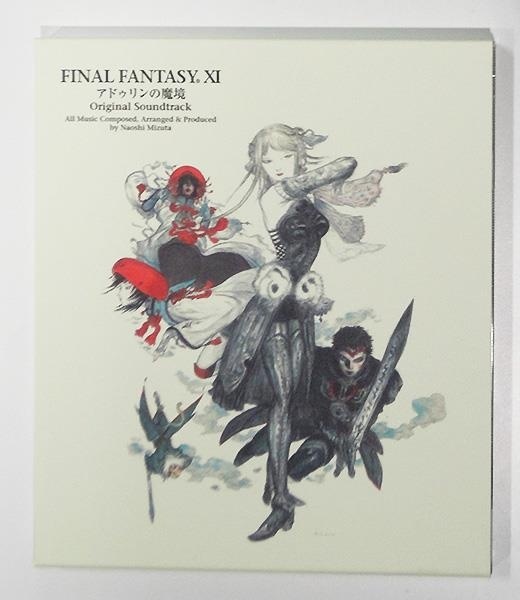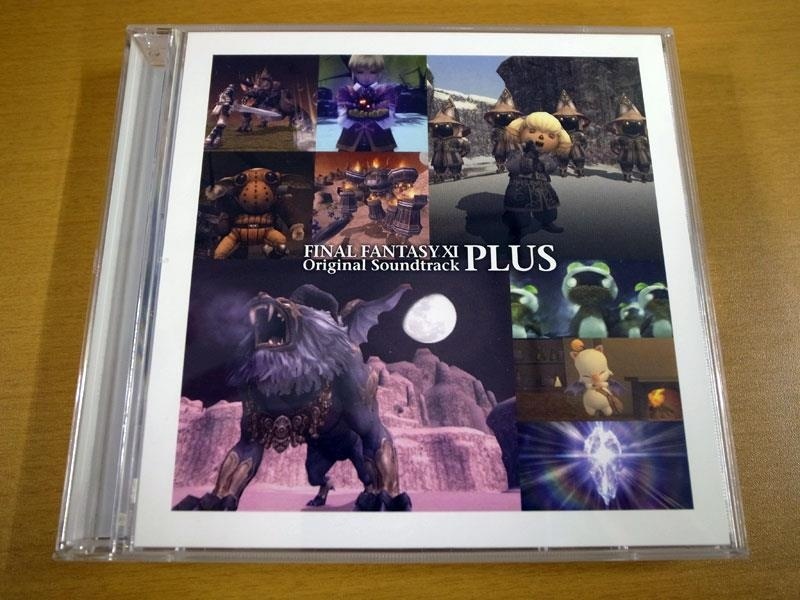
The complete soundtrack to Final Fantasy XI spans six main album releases, in addition to a PLUS album and a disc of unreleased tracks exclusive to the limited edition Premium Box, making for a grand total of just over 210 tracks altogether. Modern Final Fantasy soundtracks are generally not one to scrimp on content in any case, but this is certainly one of the larger soundtracks of the series to grapple with.
With such a large catalogue of music, then, it's inevitable that there would be a few inconsistencies and shortcomings present. For instance, while all of the individual albums have their merits, The Chains of Promathia album is probably the least well-developed, featuring dull, muddy synth pads and laboriously plodding melodies that often feel like a chore to listen to. Many tracks across the board simply fall short of expectations - for one, cookie-cutter incidental music and forgettable, generic battle themes both make numerous unwelcome appearances. At its very worst, the music of FFXI simply descends into the bland, repetitive and outright pedestrian - a far cry from the high standard set by precious Final Fantasy soundtracks.
To add insult to injury, the game does not do itself any favours by limiting the number of live musical performances on the soundtrack. The precious few live tracks featured are nestled uncomfortably alongside tracks that flaunt dated instrument samples, which sound inferior in comparison. When the music hits home, though, it does so in a big way - one example being "FFXI Opening Theme," which incorporates a number of major themes (including the series' "Prelude" theme) and is a rare example of a track in the game being performed with a full orchestra and choir. All things considered, it's a stonkingly brilliant and dramatic piece to open with - it's just a shame that it sets a standard for scale and drama that is never really matched again in the rest of the soundtrack.

It is with these tracks that the music really comes into its own and gives the game its unique sound. There is a pleasant mixture of the relaxing and meditative, along with both melancholy and uplifting tracks, most of them well-composed and interesting enough to warrant multiple listens. The tracks themselves are rarely brash or overly energetic, instead favouring a kind of calm, sedate and understated sound that is consistent throughout.
Xylophones, woodwinds and acoustic guitars especially are heard many times over the course of the soundtrack, the focus often being placed more on the texture, timbre and rhythm of these instruments, rather than the actual melodies themselves. An excellent example of this is Kumi Tanioka's "Gustaberg," which combines xylophones, strings, guitar and woodwinds layered over unconventional tribal percussion effects to create a stunning atmospheric soundscape of sweeping, solemn drama. Similarly, the track "Heavens Tower" is notable its unconventional gamelan-inspired sound and steady build-up and progression revolving around the central melody, which repeats, mantra-like, from beginning to end.

By far one of the best pieces in the game, though, is the fantastic "Sanctuary of Zi'Tah." While the unconventional melody may sound odd at first, the earnest guitar lines and solemn woodwinds come together to create a sombre piece that is heavy with sadness and nostalgia, yet still strangely comforting at the same time. It's a difficult one to pin down, but is all the better for it; the enigmatic nature of the track only adds to the replay value. Of all the tracks in the game, "Sanctuary of Zi'Tah" is the one that perhaps best embodies the entire feel and the direction of FFXI's music - it's a track that more than deserves to be placed in the same bracket as Uematsu's work on the series.
Much of the other location themes in the soundtrack retain a pleasantly high standard throughout. "Selbina," another rare instance of live instruments making an appearance, features a superb fiddle performance alongside a cute accordion interlude, adding a charming folksy flavour to an already enjoyable track. "The Grand Duchy of Jeuno" is a lilting, traditional sounding waltz that adds a touch of regality to the proceedings, while "Kazham" is an unfailingly cheerful piece, which has a subtle festival-like feel to it. Tracks such as "The Forgotten City - Tavnazian Safehold" are instantly likeable for their catchy, rhythmic guitar hooks, while "Castle Zvahl," the longest track in the game, is very much an ambient slow-burner, relying less on melody and more on presence and atmosphere to help deliver a sense of place.

Fortunately, there are exceptions. One of these is "Awakening," another contribution from Kumi Tanioka. An engaging and distinctive piece with a dark, brooding feel, it flaunts heavy use of voice synths alongside pounding drums and percussion effect, which form the backbone of the track. A middle bridge section helps keep the piece fresh, with some pretty harp arpeggios and a single voice synth melody adding some brief calm before plunging back to the previous section's intensity. It certainly has tension, but for a final boss fight theme, it all feels quite unhurried and a little restrained - but then again, when you then think about the equivalent pieces from previous games, specifically FFVI to FFX, you start to think that the big, bombastic and frantic arrangements featured in these titles were perhaps due a rest after all. FFXI in general just feels like a change of pace in the series' musical history - it's certainly a much slower, quieter and more introspective offering than previous entries.

The song "Distant Worlds," which has since spawned numerous cover versions and also lent its name to the hugely successful series of concerts performed around the world, can only be found on the Unreleased Tracks CD of the Premium Box release of the soundtrack. It's a shame, though, that this version should be marred with Izumi Masuda's Engrish vocals, which, despite my best efforts to overlook it, is still a very distracting feature. Susan Calloway's rendition as part of the aforementioned concert series is a noted improvement, but honestly, the best version of the song just might be the alternative instrumental version featured on the same disc as the original: "Distant Worlds Guitar Version." Not only does it do away with the slightly purple lyrics, but the solo acoustic guitar allows the fantastic orchestral arrangement to shine through while keeping the same sense of grandeur and sweeping majesty about it. The lack of vocals genuinely doesn't detract from it at all - though this may well just be personal preference more than anything.

Very Good - Bronze Award


 Sign In
Sign In 20.04.2016
20.04.2016  Azuardo
Azuardo 
 Link to this post:
Link to this post:  Freedom_Dive
Freedom_Dive  Subscribe to this topic
Subscribe to this topic Features
Features






 Top
Top

